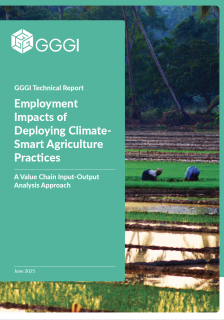
Climate-smart agriculture (CSA) is widely promoted in developing countries for its benefits in reducing climate risks, building resilience, supporting mitigation, and improving livelihoods, including jobs and income. Yet, limited evidence exists on its employment impacts.
This study helps fill that gap by examining how CSA adoption, compared to conventional practices, can support job creation in agriculture. It quantifies the employment impacts of achieving the CSA-related Nationally Determined Contribution (NDC) targets in Colombia and Ethiopia. Specifically, it estimates the total gross number of full-time equivalent (FTE) jobs supported along the agricultural value chain of selected crops over 2024–2034.
The analysis compares two scenarios: a business-as-usual (BAU) scenario using conventional practices, and an NDC scenario reflecting CSA adoption, and details the crops, CSA practices and NDC targets analyzed for each country.
